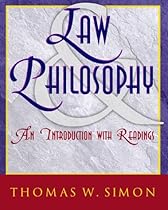Law and Philosophy: An Introduction with Readings The book considers critical issues such as civil disobedience, war crimes, and the death penalty. Legal issues are placed in their historical and philosophical contexts. The anthology includes writin
☛ eBooks Online

| Title | : | Law and Philosophy: An Introduction with Readings |
| Author | : | |
| Rating | : | 4.70 (675 Votes) |
| Asin | : | 0070275874 |
| Format Type | : | Paperback |
| Number of Pages | : | 544 Pages |
| Publish Date | : | 2000-09-11 |
| Genre | : |
Editorial : About the Author Thomas W. Simon’s dual role as a professor of philosophy (Illinois State University since 1992) and practicing attorney (licensed in DC, Illinois, and Maryland) has informed his writings and activities. He received a Liberal Arts Fellowship in Law and Philosophy at Harvard Law School (1988-89); attended the Hague Academy of International Law (1995); and taught at the University of Ljubljana Law Faculty (Slovenia) as a Fulbright Scholar (1999). His consulting duties with the Central and Eastern European Law Initiative included work on drafting the Albanian Constitution. His publications include Democracy and Social Injustice (1995) and over thirty articles in philosophy journals and law reviews. He has taught philosophy (University of Florida), political science (University of Illinois), and legal studies (University of Baltimore). He has received numerous awards for teaching excellence.
This analytical anthology introduces students with little background in either to both law and philosophy using prominent classic political philosophers, legal theorists, and abundant landmark court cases. Legal issues are placed in their historical and philosophical contexts. The book considers critical issues such as civil disobedience, war crimes, and the death penalty. It teaches the basics of international, constitutional, and criminal law and shows how philosophy of law helps makes sense of and unifies the seeming “scraps and fragments” of law. The chapters focus on different areas of law and on different philosophers and philosophies. A classical political philosopher anchors each area of law covered. The anthology includes writings from prominent political philosophers (Plato, Aristotle, Hobbes, Locke, Kant, Mill, Nietzsche, and Rawls), from classical legal theorists (Aquinas, Grotius, Austin, Fuller, Hart, and Dworkin), and from judicial opinions (Justices Blackmun
How many share my continued state of mystification over Glenn Gould? Helen Masaros' recent study is so admirable, yet, as with most of the Gould biographies I have read over the years, seems to be overly biased in favor of the subject. I believe that this book will be a diamond-in-the-rough for the change makers in the world, as it provides (not so hidden) secrets and strategies that anyone can implement at any time at their own pace. An interesting read.. Just when she'd resigned herself to a life without it - a life as a normal human - she gets the same summons to the Gathering as her sisters. Although the book is thorough, the Gauldin constantly uses phrases like "Almost always," "rarely," and "commonly" or "uncommonly" when trying to create a set of rules for early composition, and mostly uses Palestrina as a model for the rules. About 3 pages into the first lesson, it is apparent that all her illustrations are from the prior version, ADT 2005!!! Needless to say, getting her exampl
No comments:
Post a Comment